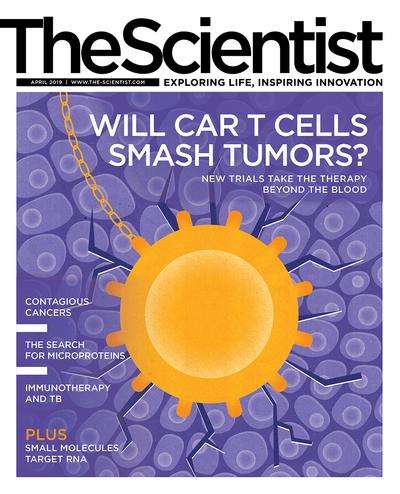ABOVE: ORIGIN STORY: Mucinous cysts of the pancreas may stem from primordial germ cells on their way to the gonads during embryonic development. WIKIMEDIA, TEXASPATHOLOGISTMSW
EDITOR’S CHOICE IN DEVELOPMENTAL BIOLOGY
The paper
K.M. Elias et al., “Primordial germ cells as a potential shared cell of origin for mucinous cystic neoplasms of the pancreas and mucinous ovarian tumors,” J Pathol, 246:459–69, 2018.
Mucinous cysts of the pancreas typically affect young women, especially smokers. It’s rare, representing only 1 percent of all pancreatic tumors, and occurs particularly infrequently in men. “The [male:female] sex ratio is really, really weird, 1:10 to 1:20,” Sana Intidhar Labidi-Galy, a medical oncologist at Geneva University Hospitals, tells The Scientist. “We had to ask, what are these tumors doing here?”
Turning to publicly available data, she and her colleagues compared gene expression profiles of 4- to 17-week-old human primordial germ cells—cells that migrate to the gonads...
The data from the pancreatic mucinous cysts, which came exclusively from women, were more similar to gene expression profiles of primordial germ cells than to those of the healthy or cancerous tissue of the pancreas. The mucinous cysts, the researchers suggest, develop from germ cells that didn’t migrate all the way to the gonads early in life, but stopped in the immature pancreas, only to become cancerous later.
Peiguo Chu, a pathologist at City of Hope Comprehensive Cancer Center in the outskirts of Los Angeles, isn’t convinced of the germ-cell origin of cysts. “Germ-cell tumors may arise from ‘left-over’ germ cells along the path [to the gonads],” he says in an email. “But germ cells never migrate into the pancreas.”
Showing that the cysts express germ-cell lineage markers would be more convincing evidence, Labidi-Galy says. The current results also don’t explain why the cancer is so much more common in women, she notes, though she’s working on that now and thinks that her team’s upcoming results will provide the answer.
Interested in reading more?







